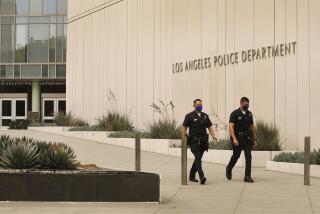Opinion: Daniele Watts case: Did confrontation with LAPD have to happen?
Here’s the basic question about the case of Daniele Watts, the young black actress who was detained and handcuffed on a Studio City sidewalk Thursday after refusing to provide identification to police officers: Did the confrontation have to happen at all?
It all started with a 911 call describing a black woman and a white man having rather explicit sex in a silver Mercedes on Radford Avenue near Ventura Boulevard. The call went out at 3:02 p.m. The first L.A. Police Department officer arrived at the scene at 3:04 p.m. According to the LAPD, he was in the neighborhood. (Let’s hope when you have to call about a serious crime, the cops come that fast.)
When Sgt. Jim Parker did arrive, no sexual misdeed was taking place. Watts was out of the car on the phone. Her boyfriend was in the car. When Parker asked for some identification, she refused. “I can’t make out with my boyfriend in front of my…studio?” she is heard asking on the audiotapes that surfaced online, courtesy of TMZ. From there, the situation gets intense and Watts gets increasingly emotional and tells the officer “I’m just going to walk away.”
So, she could have simply handed over her I.D. As the sergeant says to her later, what would have been a five-minute interlude (had she provided some form of I.D. or just given her name) turned into a 30-minute ordeal. Her boyfriend handed over his I.D. when asked (and later provided information about her identity, according to LAPD Cmdr. Andrew Smith.) Watts, who was in “Django Unchained” and has a role in the FX TV show “Partners,” asks the officer if this is about her being black and her boyfriend, celebrity chef Brian James Lucas, being white. “Who brought up a race card?” Parker asks.
On the other hand, the police might have simply driven up to the street and waited to see if the couple did anything lewd. Or the 911 caller could have decided on a busy weekday that a misdemeanor act of having sex in a car in plain view didn’t really warrant the attention of the cops -- and closed the blinds and gone back to work. Just a thought. The police were told that the caller also took pictures. Nice.
Can you refuse to hand over your identification to a cop? Yes -- if a police officer just walks up to you and asks for your identification, you don’t have to provide it. And if you do refuse, “that’s not a legal reason for them to detain you. Not in California,” says Peter Bibring, a senior staff attorney at the ACLU of Southern California.
However, when the police have probable cause or reasonable suspicion, they can ask for your ID and detain you if don’t provide it. In this case, LAPD officials say they had reasonable suspicion -- the emergency call. And the caller described Watts and her boyfriend perfectly, so the police knew they had the couple in question. And once the officer began questioning the two, they were effectively being detained. Also, Smith said, the officer needed to find out if something more than a lewd act was taking place. Was this sexual assault? Prostitution? “We expect our officers to conduct some kind of investigation,“ said Smith. Further complicating this situation, says Smith, is that the 911 caller could have asked the police to make a private person’s arrest on the caller’s behalf. (Although apparently the caller did not.)
But, says Bibring, “having an ID does not help them determine if there was a lewd act committed.”
Loyola Law School professor Laurie Levenson notes that the police have a lot of discretion in these stops. And this was on the dicey issue of lewd behavior. “At some point you can cross the line and that’s in the eye of the beholder,” says Levenson. “That’s why you would think the police would not be eager to get involved in something like that unless they see it.”
According to the cops, that line had been crossed if you believe the caller -- who had described the couple as wiping themselves and throwing tissues into the gutter outside the car.
“It’s not just an innocent little making out,” said LAPD’s Lt. Andrew Neiman. “No one here at the police department is trying to discourage people from showing affection.”
I would never advise anyone, under any conditions, not to hand over I.D. when a police officer asks for it. Complain later if you think it was unjustified. But I share Watts’ sense of frustration and insult at being interrogated because she was suspected of a fairly innocuous, victimless misdemeanor crime. She wasn’t flashing kids in a schoolyard.
“Do you think we put you in handcuffs or you did?” the sergeant asks her toward the end of the incident.
“I put myself in handcuffs?” she asks incredulously.
“I think you did the minute you left the scene,” the sergeant responds.
The question is whether there had to be a scene at all.
Follow the Opinion section on Twitter @latimesopinion
More to Read
A cure for the common opinion
Get thought-provoking perspectives with our weekly newsletter.
You may occasionally receive promotional content from the Los Angeles Times.







